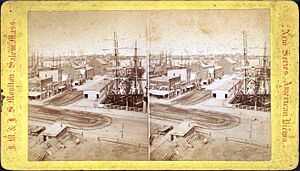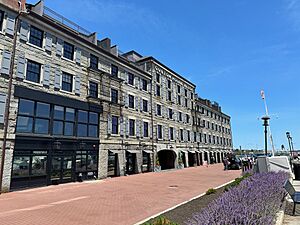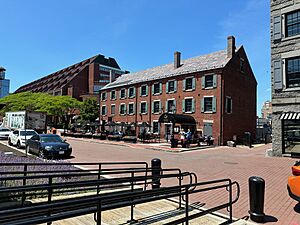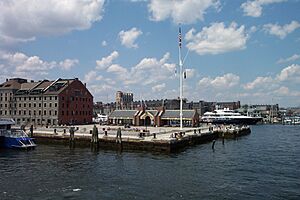Long Wharf (Boston) facts for kids
|
Long Wharf and Custom House Block
|
|
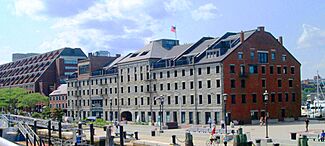
2017
|
|
| Location | Boston, Massachusetts |
|---|---|
| Area | 3 acres (1.2 ha) |
| Built | 1710 |
| NRHP reference No. | 66000768 |
Quick facts for kids Significant dates |
|
| Added to NRHP | November 13, 1966 |
| Designated NHL | November 13, 1966 |
Long Wharf is a famous pier in Boston, Massachusetts. It was built a long time ago, between 1710 and 1721. Imagine it stretching almost half a mile into Boston Harbor! Today, the wharf is much shorter because of new land added to the city. It's now a busy place for passenger ferries and boats that take people on tours.
Contents
A Look Back at Long Wharf
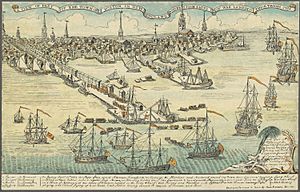
Long Wharf has a rich history, playing a big part in Boston's past. It helped make Boston an important city for trade and shipping for many years.
The Early Days (1700s)
Building the wharf started around 1710. When it was first finished, it was about a third of a mile long. This made it much longer than other wharves. Its length meant big ships could dock there easily. They could unload their goods right into new warehouses and shops. Captain Oliver Noyes built it, and it quickly became the heart of Boston's busy harbor. Over time, more land was added around the wharf. This new land is now where places like Quincy Market and the Boston Custom House stand.
Back in the 1700s, a famous place called the Bunch-of-Grapes Tavern was at the start of the wharf. The well-known painter John Singleton Copley grew up here. His mother owned a tobacco shop on the wharf. The Gardiner Building, built in the 1760s, is the oldest building still standing on the wharf. It was once where John Hancock had his business office. Today, it's a restaurant.
Busy Times (1800s)
In 1848, a large granite building called the Custom House Block was built on the wharf. It's still there today! The middle of the 1800s was a very important time for Boston. It was a major center for shipping goods all over the world. Long Wharf was at the center of all this busy activity.
However, by the late 1860s, Boston's port became less important for international shipping. A new road, Atlantic Avenue, was built through Long Wharf and other wharves. This changed the look of the waterfront forever.
Modern Changes (1900s & 2000s)
In the 1950s, a big elevated highway called the Central Artery was built along Atlantic Avenue. This highway cut Long Wharf off from Boston's main business area.
Later, Long Wharf and the Custom House Block were named a National Historic Landmark. This honor recognized their important role in Boston's history. It also celebrated the wharf's past as a major shipping hub in the 1800s.
The "Big Dig" project in the 1990s and early 2000s moved the Central Artery underground. This helped connect Long Wharf more closely to downtown Boston again. Since about 1990, Long Wharf has changed a lot. It went from a quiet commercial area to a fun place for recreation and culture.
Today, Long Wharf is right next to the New England Aquarium. You can get there easily by taking the MBTA's Blue Line subway to the Aquarium station. MBTA boat services connect the wharf to places like the Boston Navy Yard in Charlestown and Logan International Airport. Other ferries take people to the Boston Harbor Islands National Recreation Area and cities like Salem and Provincetown. You can also take many different harbor cruises. The wharf itself has a hotel, restaurants, and shops. At the very end, there's a large open area with great views of the harbor.
The Custom House Block
The Custom House Block was built between 1845 and 1847. It used to be a large warehouse. The architect Isaiah Rogers designed this four-story building. It was made from strong granite and brick. In its busiest days, it was part of "Boston's busiest pier." It was a key spot for trade and for people traveling. Today, private owners take care of the building. It was updated in 1973.
The Old Gardiner Building
The Gardiner Building is a brick building in the Colonial style. It was first built in 1763 and then rebuilt in 1812. At one time, it was used as John Hancock's business office. Long Wharf used to have many buildings like this. But the Gardiner Building is the only one left. It is the oldest building still standing on the wharf. It was also updated in 1973. Now, it is a seafood restaurant.
The Gardiner Building has a slate roof and special "six-over-six" windows with shutters. Its window frames and sills are made of granite.
What You Can Do at Long Wharf Today
Many boat services operate from Long Wharf:
- MBTA Boat (on the north side)
- Ferries to the Boston Harbor Islands National Recreation Area (north side)
- Ferry to Salem, Massachusetts (north side)
- Ferry to Provincetown, Massachusetts
- Water taxi services
- New England Aquarium harbor tours (on the south side) – the Aquarium itself is on Central Wharf, just south of Long Wharf
- Various harbor cruises
- Docks for private boats
More to Explore
- Boston Marriott Long Wharf, a hotel at 6 Long Wharf
- Custom House District, the area near Long Wharf
- Boston Custom House, built in 1849 on State Street
- State Street Block, built in 1857 on State Street
 | William L. Dawson |
 | W. E. B. Du Bois |
 | Harry Belafonte |


